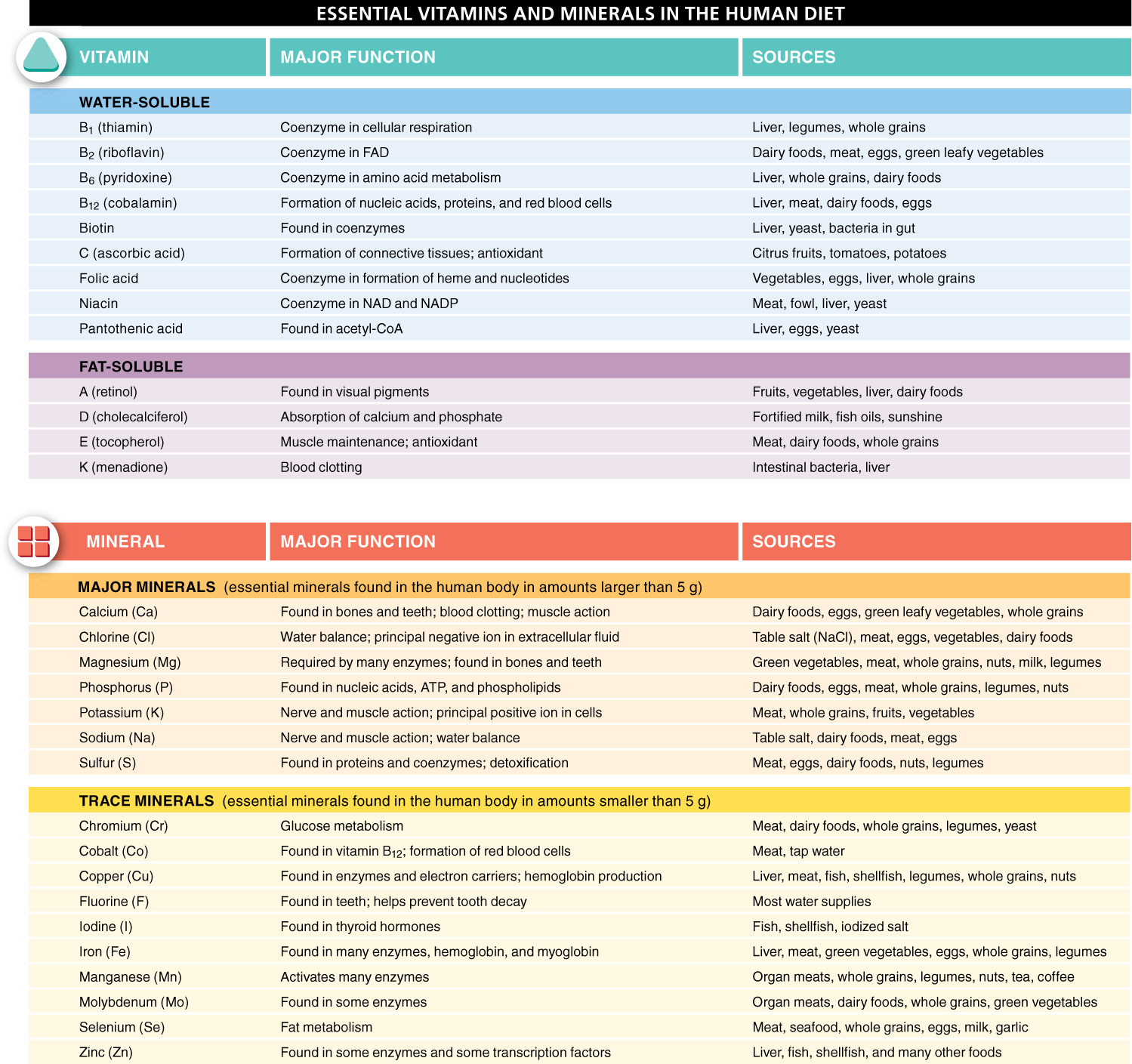22.7: Vitamins and minerals are necessary for good health.
“Vitamins can double your health!”
— DR. ATKINS, on The Larry King Show (making perhaps the most nonsensical nutritional claim ever)
It would be nice if we could take a pill that would make us more healthy or fit. Vitamins are not such a miracle pill. They’re a bit like security guards at a museum: above a certain number, they don’t make the museum any better, but in their absence, the museum is likely to become a whole lot worse. And while vitamin supplements are not a health panacea, vitamins and minerals do have an important role in nutrition.
Vitamins are organic compounds that are essential nutrients required by the body in small amounts for normal growth and health. Minerals are the chemical elements, other than those commonly found in organic molecules—
- 1. They don’t yield any usable energy. Rather, they serve as collaborators with enzymes to enable the processing of the proteins, carbohydrates, and fats we eat, and they catalyze a wide range of other chemical reactions around the body.
- 2. They need to be consumed in much smaller amounts than proteins, carbohydrates, and fats in our diet. This is because they tend to serve as reaction catalysts and so can be recycled and reused again and again.
- 3. If we have a healthy diet, we tend to consume sufficient quantities of vitamins and minerals in our food.
Although their biological roles are frequently similar, vitamins and minerals have a fundamental chemical difference. Vitamins are organic molecules, meaning they contain carbon, whereas minerals are inorganic nutrients. Because vitamins are organic, they are more fragile, easily destroyed by heat and other chemical or physical extremes. Minerals, on the other hand, are elements, so they can’t be broken down further or lose their chemical identity. They stay in your body until they are excreted. In fact, the only way they can be lost is if they are leached away—

886
Thirteen vitamins essential to humans, also described in Figure 22-14, have been discovered. They fall into two groups, based on whether they are soluble in fat or water. The water-
There are four fat-
887

Currently, more than half of the U.S. population takes regular vitamin supplements (FIGURE 22-15). Usually, taking vitamin supplements is a costly but harmless behavior. The consumption of increasing amounts of vitamins often just leads to a plateau of maximum benefit, after which greater consumption has no additional benefits. Occasionally, however, taking vitamin and mineral supplements is both costly and harmful: in many cases, above a certain point, additional consumption of fat-
Most people in the United States receive all of the nutrients they need from the foods they eat and have no need to take vitamin and mineral supplements. Under special circumstances, however, some individuals may benefit from a nutritional supplement.
- Women who lose unusually large amounts of blood during menstruation may need iron.
- Post-
menopausal women and those allergic to milk may not get enough calcium in their diet to prevent bone degeneration. - Pregnant and breast-
feeding women may need additional vitamins and minerals to support a developing fetus or rapidly growing infant. - Pregnant women, or women who may become pregnant, may need additional folate, which helps prevent neural tube defects.
- People on extremely low-
calorie diets may need vitamin and mineral supplements. - People with limited consumption of milk or sun exposure may need additional vitamin D. Because of insufficient levels of ultraviolet energy from the sun at latitudes above 42° (in the United States, a line extending approximately from the northern border of California across to Boston), individuals in these regions are unable to produce sufficient vitamin D from sun exposure alone.
- People with absorption problems (such as when taking antibiotics, or having an infection, or following surgery) may need vitamin and mineral supplementation.
Individuals who do not fall into these groups, however, generally get all of the essential vitamins and minerals simply by eating a varied diet, rich in nutritious foods.
TAKE-HOME MESSAGE 22.7
Vitamins and minerals are organic and inorganic molecules, respectively, needed in the diet. They are used in the production and action of enzymes and other molecules involved in the processing of food and other biochemical reactions. While vitamins and minerals are essential in small amounts, most people in the United States do not benefit from taking them as supplements.
Although most people in the United States do not need to take vitamin and mineral supplements, there are some circumstances when supplementation is necessary. Describe at least three of these cases.
888